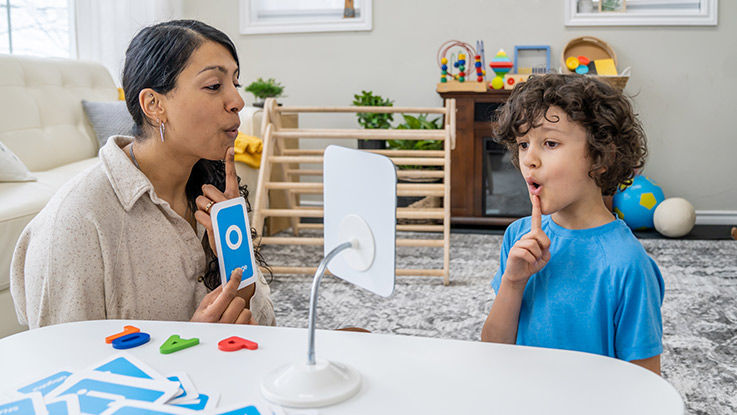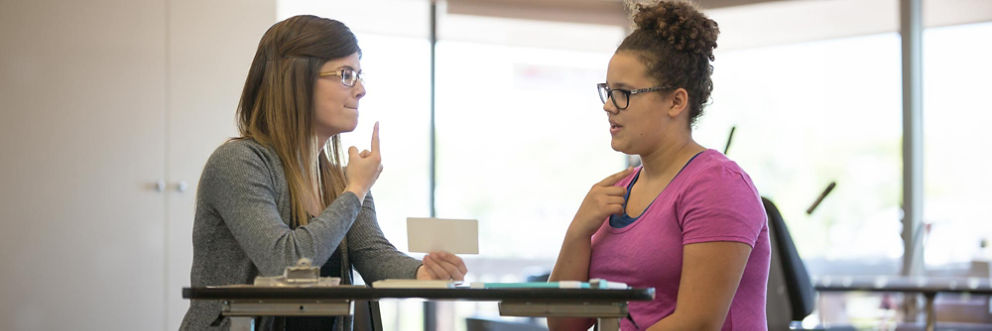Speech Therapy
Speech therapy services in Minnesota and western Wisconsin
Communication is one of the most important parts of life. Through speech and language, we build relationships, ask for what we need and experience the world. When speech disorders, illness or other conditions make communication challenging, our speech-language pathologists (SLPs) are here to help.
At HealthPartners, we offer speech therapy services for patients of all ages, from infants to seniors. Our SLPs provide comprehensive evaluation, education and treatment for people with speech, language, cognitive, voice and swallowing issues.
With clinics in Minnesota and western Wisconsin, we make it simple to get speech therapy when and where it’s most convenient for you. No matter what your needs are, our speech-language pathologists will develop a personalized treatment plan to help you meet your goals.
Who can benefit from speech therapy services
Speech therapy can be used to treat much more than conditions that impact the way you speak. If you’re struggling with speech, language, voice quality, swallowing or cognitive changes, you could benefit from speech therapy.
Our speech-language pathologists work with patients from a variety of backgrounds. We also work closely with people who are managing neurological conditions, including stroke, brain injury, ALS, Parkinson’s disease and cancer.
Speech disorders we treat
- Aphasia
- Apraxia
- Articulation disorders
- Chronic cough
- Cognitive-communication disorders
- Communication changes from hearing loss
- Difficulty swallowing (dysphagia)
- Dysarthria
- Expressive language disorders
- Fluency disorders (stuttering)
- Receptive language disorders
- Resonance disorders
- Speech and language delays
- Vocal cord dysfunction
Our speech therapy services
We offer a comprehensive range of speech therapy services in Minnesota and western Wisconsin for patients of all ages. Our services include speech therapy, pediatric speech therapy, voice therapy, speech therapy for neurological disorders and many others.
Speech therapy
Speech therapy is a specialized type of rehabilitation that’s used to assess and treat a range of conditions affecting your ability to speak, swallow or use language. During speech therapy, our SLPs will assess your symptoms, discuss your treatment goals and create a specialized speech therapy treatment plan that meets your unique needs.
Depending on your concerns, we’ll use a combination of exercises, education and assistive technology to help you communicate more effectively. Our SLPs may work with you to improve your breathing and breath support, achieve a louder or clearer voice, strengthen muscles used while swallowing, improve your memory and improve your ability to communicate complex thoughts. We’ll also educate and guide you and your family so you can continue your recovery at home.

Pediatric speech therapy
We help children overcome challenges in speech, language, communication, voice and feeding. We carefully assess each child's individual needs to create a personalized care plan. Our pediatric speech therapy services are available for children from birth to 18 years old.
Speech therapy support for neurological disorders
A neurological condition can impact your memory, the way you communicate, process language or swallow. Our SLPs offer
We also work closely with neurosurgeons and neurologists across our care organization to offer speech therapy rehabilitation whenever our patients need it. This includes providing speech therapy services at
Speech therapy for ALS
Speech therapy is often recommended as part of treatment for ALS. Our speech-language pathologists will identify your unique needs in the areas of communication, swallowing and thinking. When needed, we may recommend alternative or augmentative communication devices. Our SLPs may teach you how to use devices that are controlled with eye movements or use a pre-recorded version of your voice (called voice banking).
Speech therapy for Parkinson’s disease
Parkinson's Disease can make your voice softer or communication difficult. You may experience changes to your memory or thinking, and you may notice you cough when eating or drinking. Our speech therapists can work with you to improve and manage changes to communication, thinking and swallowing.
Depending on your unique needs, we may recommend frequent speech therapy sessions when you first begin therapy. Repeated practice has been shown to best reduce the symptoms of Parkinson's. After you learn new skills, our team will show you ways to maintain them on your own so you can continue to manage symptoms at home. We also offer options to exercise your voice through singing and communication groups at some of our locations, including the

Video swallow studies (videofluoroscopic study)
There are multiple issues that can cause someone to struggle with swallowing, choking or coughing. In order to diagnose and treat these issues, we may perform a video swallow study, sometimes called a modified barium swallow study.
A video swallow study lets our SLPs see what’s happening in your mouth and throat when you chew and swallow. During this test, we’ll ask you to eat and drink in front of an X-ray. Then, we’ll review the videos of you eating to determine what care may work best for you.
Voice therapy
Voice disorders can cause issues like hoarseness, laryngitis and difficulty swallowing. Our SLPs will work with you to identify the cause of your voice condition and develop a personalized treatment plan. This may include vocal exercises, breathing techniques and other strategies to improve vocal function and help your voice sound more like it did before.
If you’re
Videostroboscopy
With videostroboscopy, we can assess the function of your larynx (voice box) and vocal folds. This test uses a camera with a strobe light to record your vocal cords while you speak. We then watch this video in slow motion to assess how the vocal cords move, which can help us understand what is causing problems with your voice.
Speech therapy support for cancer
Cancer, especially types that affect the head and neck, can change the way you communicate and swallow. Our SLPs provide a wide range of speech therapy for people recovering from or

Aural rehabilitation
Hearing aids and cochlear implants are effective tools to help with hearing loss, and they have a large impact on how we communicate. We offer aural rehabilitation that’s specifically designed to support people with hearing loss. With guided practice in both quiet and noisy environments, we’ll help you learn communication strategies, and improve speech clearness and language skills.
